EVERLIGHT
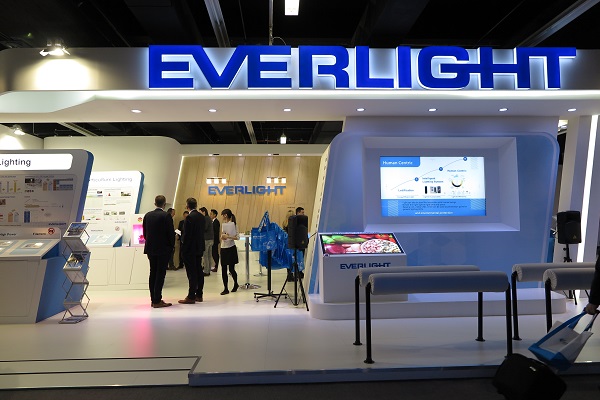 |
|
(Image: LEDinside) |
EVERLIGHT demonstrated monochromatic light LEDs that are widely applied for horticulture lighting. It developed a special series of products based on monochromatic light wavelength to cover PAR 450-745 nm from high to low power with SHWO 3535-ELB, 3030-ELB and 2835-ELB.
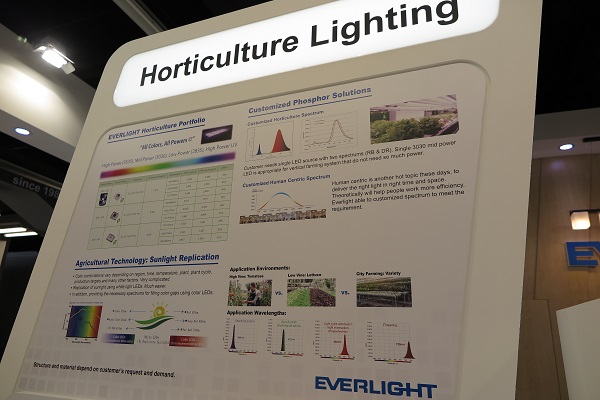 |
|
(Image: LEDinside) |
The company also showcased its ‘smart’ LED package—EL Micro Multi (1216)—for both interior and exterior automotive lighting. Integrated with a microscopic driver IC, each LED package can be controlled individually to create vibrant interior ambient lighting. Currently, EVERLIGHT is partnering with automakers to design rear lights using its smart Multi LEDs for high-end vehicles. It seeks to distribute the product to the electric vehicle market and expects a growth in the market demand for advanced automotive LEDs in 2025.
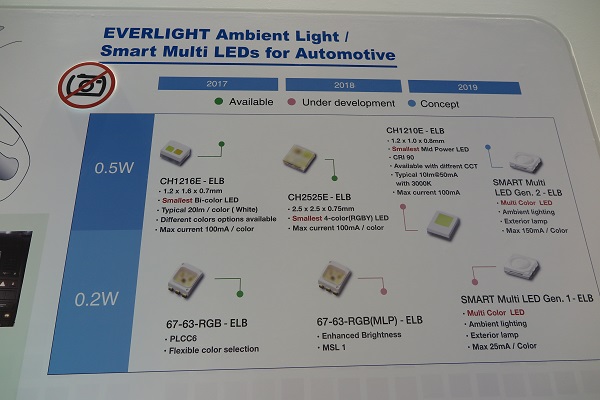 |
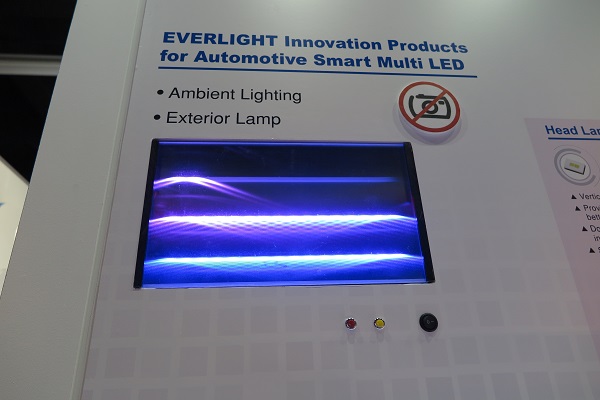 |
|
(Images: LEDinside) |
Lumileds
The products Lumileds exhibited this year emphasized three specific features: complete color presentation, excellent beam control, and cutting-edge optics.
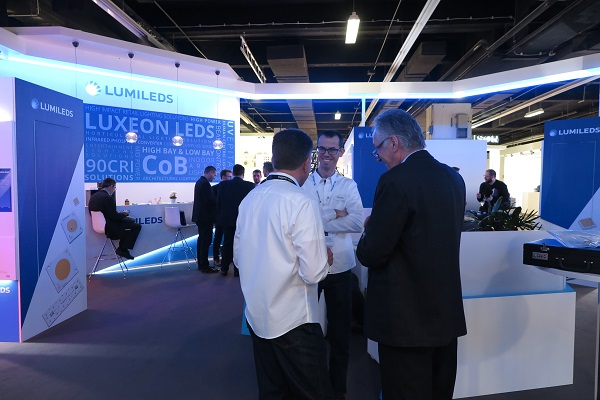 |
|
(Image: LEDinside) |
The LUXEON Color family offers a wide range of light color choices from white, green, lime, to amber and red. It can be used for entertainment, architectural, and horticultural lighting. Particularly, in terms of horticultural lighting, the company tested and binned LEDs for plants based on photosynthetic photon flux (PPF).
Lumileds also displayed the LUXEON CoB Core Range of chip-on-board LEDs, which feature 5 percent greater efficacy than the nearest competitors.
Another highlight of Lumileds is the Matrix Platform. The Matrix Platform offers infinitely configurable LUXEON LED on advanced substrates, available in a virtually limitless range of options for any application. Instead of buying binned LEDs, customers can get the LUXEON LEDs that meet their complete design requirements on either a flexible or rigid substrate—making them ready for installation into their luminaire assembly.
Epistar
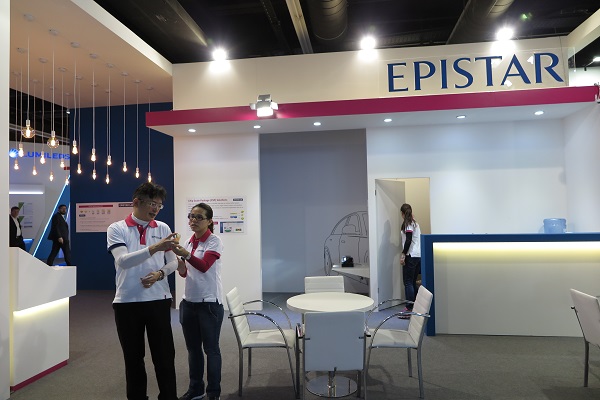 |
|
(Image: LEDinside) |
Epistar showcased LED filament bulbs, GaN devices for lighting, horticultural LED chips, and IR LED for bio-sensing applications at this year’s Light and Building. In particular, it demonstrated a bio-sensing device it co-developed with MediaTek, one of the biggest semiconductor companies in Taiwan.
The bios-sensing module is an advanced health monitoring solution which, with Epistar’s IR LED embedded, takes readings from users’ fingertips to track heart rates, blood pressure, blood oxygen information and other health information.
The Taiwan-based LED chip maker provides a complete IR LED portfolio covering a wavelength range from 660nm to 1600nm and especially focuses on developing products with specific wavelengths for bio-signal measurements. As Tier 1 companies are all making effort on promoting bio-sensing applications, it will be driving the future demand for IR LED, Epistar estimated.
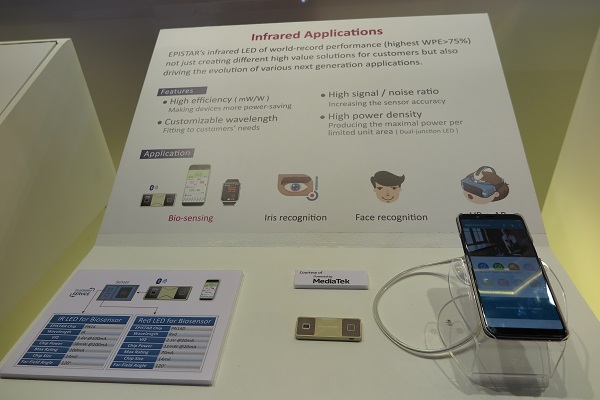 |
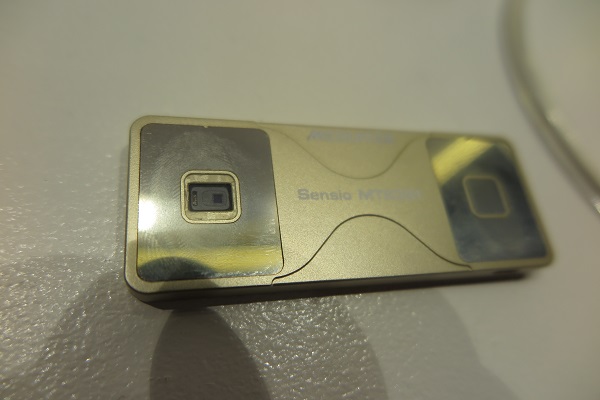 |
|
(Images: LEDinside) |
Osram Opto Semiconductors
Osram Opto Semiconductors unveiled the prototype of the Oslon Pure 1010 at this year’s Light+Building. Sized at 1 mm x 1mm, the LED is designed to be used in spotlights for retail lighting where compact LEDs with high light output are needed for articles on display.
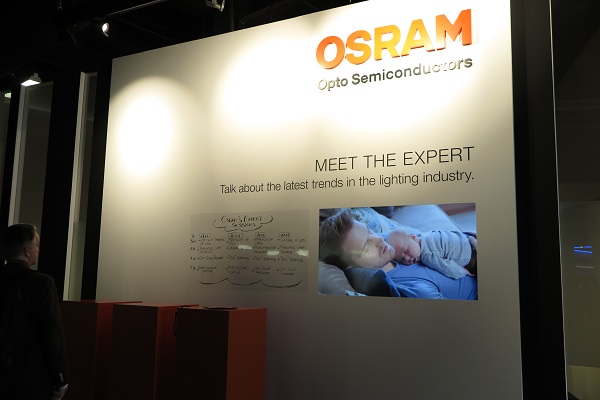 |
|
(Image: LEDinside) |
The scalability of the chip-scale package (CSP) LED enables flexibility in putting together individual lighting solutions, according to Osram. Osram said that, with typical luminous flux of 100lm at a drive current of 350mA and a color temperature of 3000K, the prototype almost perfectly follows Lambert’s law and achieves a flux density of 237lm/mm² when operating at 1000mA. The achieved luminance is then much higher for the same component size. This property is useful particularly if the new LED is used for illuminating merchandise in retail outlets.
The LED will be available in May at the earliest. A CRI-90 version will also be launched in fall 2018.
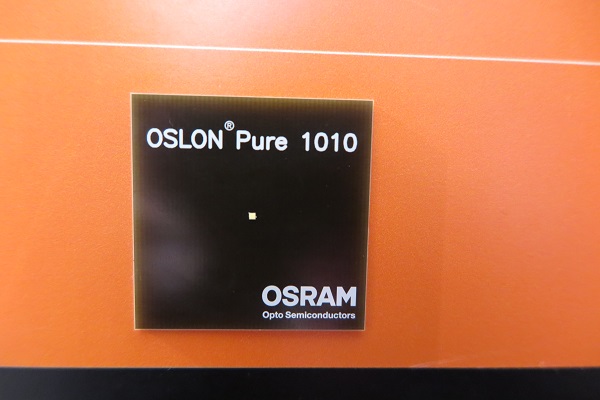 |
|
(Image: LEDinside) |
Samsung
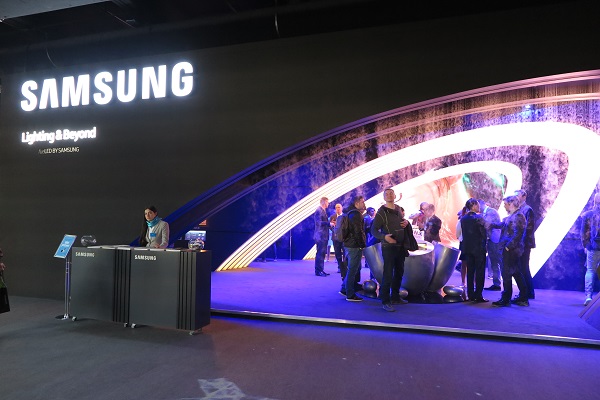 |
|
(Image: LEDinside) |
Samsung shared its business outlook with LEDinside at the fair. The whole industry chain has been impacted by Chinese LED manufacturers and the Chinese government as their supporter, the company revealed. The market has turned into a bloody red ocean, full of technology competitions and price wars.
However, Samsung expressed that, instead of competing with the Chinese firms, it will work closely with them to maintain the competitiveness of its cost structure. It proposed ‘the Orca Strategy’—be fast, strong, and smart in the industry—and showcased four innovative technologies it is working on that can secure its position as one of the leading suppliers. They include the MC CSP Display module, the Pixel Lighting Module, the IoT Module (ITM), and the Ultra-Wideband Sensor (UWB).
Among them, the MC CSP Display Module is manufactured with 12-inch (300 mm) GaN-on-SiC wafers and used for applications such as automotive lighting, smartwatches, and displays.
Cree
In line with this year’s expo theme ‘Inspiring Tomorrow’, Cree demonstrated future-oriented street lighting line. The street lights were equipped with next generation LEDs and the latest optics that represent Cree’s commitment to consistently deliver high-quality lighting at low energy costs.
Cree has participated in a few Smart City projects in urban centers across Europe, the Middle East, and Africa. It introduced the WaveMax Technology to its street lighting applications. The technology redefines how light is delivered by using precisely-shaped optical elements to create a transformative optical waveguide platform to capture and carry light.
LEDinside also asked the company about the acquisition of Infineon’s Radio Frequency (RF) Power Business, and we got a response from Jim Milligan, Vice President, RF and Microwave Products at Wolfspeed, A Cree Company:
“This announcement is great news for Cree and Wolfspeed business. Cree recently outlined its transformation strategy, which identified the Wolfspeed power and RF business unit as the primary growth engine for the company. Cree expects to significantly grow Wolfspeed’s revenue over the next four-to-five years by concentrating on high growth applications where our SiC and GaN technologies have a distinct advantage, including electric vehicles, renewables and telecom.”












